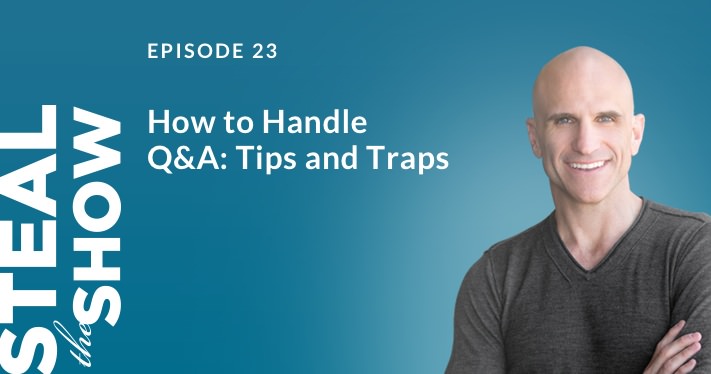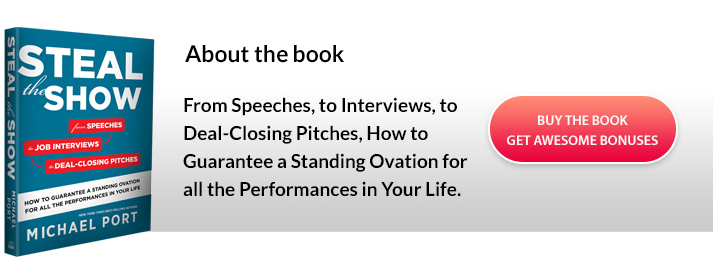00:00 Welcome to Steal The Show with Micheal Port. I am Micheal and I am honored to have you here. This episode is Q&A Tips and Traps because you know a skilled speaker and performer, and that means you, needs to professionally manage her Q&A sessions after a speech because things can go wrong if you’re not careful. And remember, this episode and all the others are based on the book, ‘Steal The Show,’ which is available anywhere books are sold or head on over to stealtheshow.com, that’s stealtheshow.com, and checkout all the bonuses I give you when you purchase the book. Free templates, tickets to live events around the country, free public speaking coaching, video training, production kits templates and much more. My goal in life is to delight and entertain you, and help you see just how fantastic you are. Q&A Tips and Traps, here you go. You ready? You ready for this? I think you are.
01:00 Number one. Never say, “That’s a great question.” I rarely say never do something, but in this case this is an exception because if some questions are great what are the other questions? Bad ones? It’s natural to get exited about a particular question and inadvertently express your appreciation. However, you can reframe your response with just a little bit of forethought. Try instead, “This is the first time anyone has asked me that,” or “Well, that’s a different way to think about it,” or better yet just answer the question with excitement without qualifying the worth of the question.
01:44 Now, if you have a questioner who is confrontational, or won’t give up the mic, it doesn’t happen often, but it can happen. According to Freud, groups tend to normalize neurosis and your audience may actually fix the disrupter for you and if not the heckler can take over your event and normalize the group to their way of thinking. Now, you can be gentle or fierce and need to have the discretion to know which is required and when. See, all you have to do is say, “Thank you, I’m gonna take the next question.” That’s it. Just with that one sentence you’ve got the floor back, you just need to have the guts to do it.
02:29 Now, if that doesn’t work, you can offer to answer their longer point after the session if you’re so inclined and then move on to the next questioner. Just don’t get defensive, don’t argue your point, don’t try to push back. If you wanna move on just move on. Now, for questioners who make statements or start their own speech, ask them to rephrase it as a question or just take the floor back in the way that I just described. Because if they say, “In my experience,” well, if that’s the way they start their question you’re pretty sure that they don’t actually have a question. So you can say, “Do you have a question or do you just wanna make a statement because this time is alloted for questions from the audience.” Now, that’s only if you need to be fierce because you always wanna be respectful and kind, and charming, and generous to the audience, but sometimes you just need to be more direct and you need to have the guts to do it. Just make sure that if you do say something like that then you paste it a big generous smile across your face because your audience will lose respect for you if you let people carry on.
03:48 So you can cut this speechifier off with your voice. But sometimes just a gesture of a palm held in the upraised stop position, along with a quick nod of your head as though to say, “that’ll do” are enough. Now, for questioners who ask a question you already answered in you presentation, the gentle reproach is along the lines of, “Oh, I answered that earlier,” and then you can respond if the answer is short or “I’ve talked about that but let me re-articulate it quickly and succinctly.” Now, for a questioner who persists in asking questions you’ve already answered, you can be a bit more pointed. You can say, “Since I covered that earlier, why don’t you get the notes from somebody else so I can address questions on areas not covered. Thanks so much.”
04:40 You can also play with them like I sometimes do. I might say, “Did you come in late?” And if they say “No” I say, “Oh were you sleeping?” And they say “No” and I say, “Okay, then I must have not have been clear when I detailed that in my speech so let me re-articulate it.” But if they say yes, that they came in late, you can say, “Oh, gotcha. So please get the notes from a colleague or from a friend in the room and in this way I can cover topics that were not already covered in the speech.” Because here’s the thing, if you take time away from the other people in the audience to re-articulate something that the person should have heard by being in the room in the first place then the audience who is there will feel slighted. They’ll feel like you’re not respecting them, and other audience members really will thank you because people do not want their time wasted by those who don’t pay attention or who come in late.
05:43 Now, this technique only works if you’ve addressed the issue clearly during the presentation. If you didn’t some people may need clarification and then you can use the Q&A time to make sure everyone is clear. Obviously, I’d rather you be clear during the presentation, but every once in a while we say something or share something or introduce a concept that is not crystal clear and then we have to adjust.
06:06 In most cases, your Q&A will include lots of relevant on-topic questions, but even when they are not, don’t take down the mood in the room and leave a bad taste by humiliating or tangling with an audience member unless you have no choice in order to save your event. Make your answer super-specific, crisp and short. Unnecessarily long answers on the speaker’s part will quickly bore the audience just as they’re getting eager to leave. This is why… And this is counter-intuitive, it’s contradictory to what is typically done. This is why I suggest not doing Q&A at the end of a speech. Because if you do Q&A at the end of a speech, you have given the energy over to the people in the room. You are now not in-control of the energy in the room. You are not the one who decides how it ends.
07:08 So, what you can, instead, do is give your presentation. Let’s say, you have 60 minutes and they want 15 minutes of Q&A. You say, “Let’s tack on five more minutes and let’s make it 65 minutes. Here’s what we’re gonna do. I’m gonna do a 45-minute presentation. Then we’re gonna take a 10-minute break, then we’re gonna come back for a Q&A session.” So, there are different sections. If you want to make sure that you keep your high status because the stage is a place of status, you can have two chairs on the stage. You sit in one and then you have the host of the event sit in the other and field the questions for you. And in this way you are not dealing with the idiosyncrasies of the different people in the room, you’re answering the questions that the host feeds to you.
07:54 Now, if that’s not an option, then you can certainly deal with the questions and handle them yourself. But this way, it feels like a separate segment. Nonetheless, always have at least two or three minutes prepared that you will use at the end of the Q&A to make sure you close on the note that you want to. But I really do encourage breaking them up, splitting them apart.
08:14 I love doing Q&A. I hope you do too now that I have given you some tips and also made you aware of the potential traps that you can run into when doing Q&A. If you want more of this, buy the book either the hard cover book or the audio book if you like the sound of my voice. In the audio book, I don’t make any mistakes. I just go right through it perfectly crystal clear because I’m reading the whole thing. In a podcast, not as much.
08:39 So, if you want bonuses, if you want giveaways, if you want goodies when you buy the book, then you need to do it at stealtheshow.com, stealtheshow.com and you’ll see that I’ve got free templates for your speech preparation, tickets to live events around the country, public speaking training via video for free and much more. My goal is just to delight and entertain you and do whatever I can to help you see just how fantastic you are. So, keep thinking big about who you are and what you offer the world. Until next time. This is Michael Port and Steal The Show.








